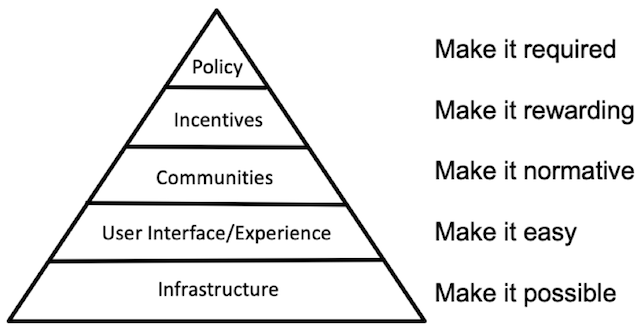3.5 Conclusion
Open Science encompasses a diverse set of principles and practices. How these are prioritized, articulated and implemented shifts between disciplines and contexts of practice. And we've only just touched on a few of these over the last several chapters. If you're interested in exploring in more detail how Open Science has been articulated in practice, an excellent resource is Open Science: One Term, Five Schools of Thought, by Benedikt and Sascha Friesike.
The tools by which we engage in Open Science are equally as diverse and context and discipline specific. However, we hope we have conveyed that certain over-arching approaches, however they may be implemented, set the stage for better science and better evidence. Keeping things organized and documented underpin reproducibility and communication. Using tools and computational approaches that ensure things are both machine and human readable facilitate accessibility and longevity - an extension of this, literate programming, will be explored in more depth in future classes. Re-framing research to be diverse and inclusive enriches the kinds of questions we ask, how we ask them, and the implications this research has on the world around us. Context and audience specific science communication increases literacies and helps to build partnerships.
In this module we've seen a number of challenges to the uptake and implementation of these principles. We've seen a number of examples of researchers and research teams at UBC and in Canada who have tried to overcome these challenges. We've also seen examples of policy and organizational efforts to persuade researchers to adopt these principles and practices and to adapt the ways in which they conduct research. Lastly, we've seen attempts at changing funding models and reward systems that help to shift how research efforts, inputs, and outputs are recognized and awarded. A shift of practice of this scale is not a small undertaking. As food for thought, we'll leave you with a visualization articulating what is needed to shift to Open Science from the founder of the Center for Open Science, Brian Nosek.

Embedded image. Source: Nosek, B. (2019, June 11). Strategy for Culture Change. Blog post.